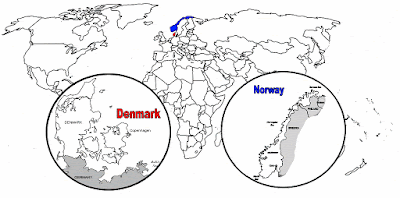LESSON IV.
___________________
WHY THE SEA IS SALT. (Concluded.)
DEFINITIONS.—l. De-vout'ly, in a reverent manner.
5. Re-flect'ing, throwing back light, heat, etc., as a mirror. Land'-mark, an object on land serving as a guide to seamen. Ex-traor'-di-na-ry, wonderful.
9. Whirl'-pool, a gulf in which the water moves round in a circle. Peas'ents, those belonging to the lowest class of tillers of the soil in Europe.
IV. WHY THE SEA IS SALT. (Concluded.)
Read and discuss this fairy tale conclusion with a friend or family member.1. When the people went by the house to church, the next day, they could hardly believe their eyes. There was glass in the windows instead of a wooden shutter, and the poor man and his wife, dressed in nice new clothes, were seen devoutly kneeling in the church.
2. "There is something very strange in all this," said everyone. "Something very strange indeed," said the rich man, when three days afterwards he received an invitation from his once poor brother to a grand feast. And what a feast it was! The table was covered with a cloth as white as snow, and the dishes were all of silver or gold. The rich man could not, in his great house, and with all his wealth, set out such a table.
3. "Where did you get all these things?" exclaimed he. His brother told him all about the bargain he had made with the dwarfs, and putting the mill on the table, ground out boots and shoes, coats and cloaks, stockings, gowns, and blankets, and bade his wife give them to the poor people that had gathered about the house to get a sight of the grand feast the poor brother had made for the rich one.
4. The rich man, was very envious of his brother's good fortune, and wanted to borrow the mill, intending—for he was not an honest man—never to return it again. His brother would not lend it, for the old man with the white beard had told him never to sell or lend it to anyone.
5. Some years went on, and, at last, the possessor of the mill built himself a grand castle on a rock by the sea, facing the west. Its windows, reflecting the golden sunset, could be seen far out from the shore. It became a noted landmark for sailors. Strangers from foreign parts often came to see this castle and the wonderful mill of which the most extraordinary tales were told.
6. At length, a great foreign merchant came, and when he had seen the mill, inquired whether it would grind salt. Being told that it would, he wanted to buy it; for he traded in salt, and thought that if he owned it he could supply all his customers without taking long and dangerous voyages.
7. The man would not sell it, of course. He was so rich now that he did not want to use it for himself; but every Christmas he ground out food and clothes and coal for the poor, and nice presents for the little children. So he rejected all the offers of the rich merchant. The merchant, however, determined to have it; he bribed one of the man's servants to let him go into the castle at night, and he stole the mill and sailed away with it in triumph.
8. He had scarcely got out to sea, before he determined to set the mill to work. "Now, mill, grind salt," said he; "grind salt with all your might!—salt, salt, and nothing but salt!" The mill began to grind and the sailors to fill the sacks; but these were soon full, and in spite of all that could be done, it began to fill the ship.9. The dishonest merchant was now very much frightened. What was to be done? The mill would not stop grinding; and at last the ship was overloaded, and down it went, making a great whirlpool where it sank. The ship soon went to pieces; but the mill stands on the bottom of the sea, and keeps grinding out "salt, salt, nothing but salt!" That is the reason, say the peasants of Denmark and Norway, why the sea is salt.
DEFINITIONS.—l. De-vout'ly, in a reverent manner. 5. Re-flect'ing, throwing back light, heat, etc., as a mirror. Land'-mark, an object on land serving as a guide to seamen. Ex-traor'-di-na-ry, wonderful. 9. Whirl'-pool, a gulf in which the water moves round in a circle. Peas'ents, those belonging to the lowest class of tillers of the soil in Europe.
Write down the vocabulary words without markings with definitions:
What fairy people are told about in this story?
How did the poor man find the way to the land of the dwarfs?
Do you think the old man would have told him if the poor man had not been so polite?
How did the poor man treat his rich brother in return for his unkindness?
How was the greed of the dishonest merchant punished?
What is meant by "strangers from foreign parts"?
Where are Denmark and Norway?
Coloring in your home country, Demark, and Norway.












No comments:
Post a Comment
Note: Only a member of this blog may post a comment.